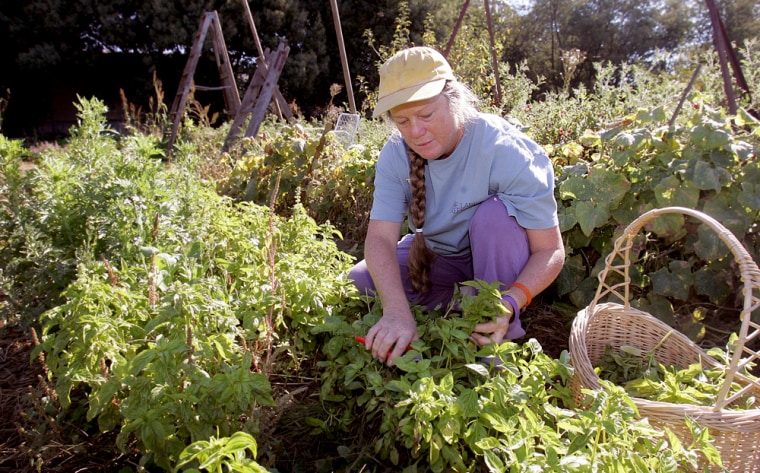The tomatoes, basil and apples that Shelley Arrowsmith grows on her modest 2.5-acre farm in Sonoma County are produced without chemical fertilizers or pesticides.
Flowers surrounding her vegetable garden attract what she calls “good bugs” that eat the troublesome ones. In her beehives, grease pads draw mites away from the hives and are later eaten by ants.
While she has a choice about whether to use chemicals, she worries about a possible change in the county’s agricultural industry that may leave her without a choice: the use of genetically altered crops.
Fear of having her produce contaminated by such crops prompted her to support a local measure on the Nov. 8 ballot. Measure M would ban the planting or cultivating of any genetically altered crops in Sonoma County, a region best known for its pastoral vineyards and lush orchards.
“The bees have no boundaries,” Arrowsmith said. “They can go wherever they want.”
Voters already have approved similar bans in three California counties, but rejected them in three others. Opponents of genetically modified crops have lobbied for outright bans in Hawaii and Vermont, but California remains the only state in the nation with local bans.
If approved, Sonoma County would be responsible for enforcing fines up to $1,000 for each violation.
Critics want more research
Farmers have lined up on both sides and the campaigns have spent a combined $850,000 — approaching the most ever spent on a Sonoma County ballot fight.
Opponents of genetically modified crops say there’s insufficient research on the health effects of eating contaminated food. Their campaign is largely funded by a local organic farm and education center. Arrowsmith, 54, worries they will migrate to her farm from nearby fields, perhaps through pollinating bees.
Such fears are unfounded, said Lex McCorvey, executive director of the Sonoma County Farm Bureau, which opposes the ban and has raised money from farmers and wineries to fight it. He said different species of apples or tomatoes can be planted next to each other and not become contaminated. The risk of cross-pollination is very low for crops such as corn, he added.
Many foods commonly found in grocery stores also are the result of genetic tinkering, he said.
“We’ve been dealing with all these risks in agriculture since the beginning of time,” McCorvey said.
The proposed 10-year ban on genetically modified crops could hurt Sonoma County farmers in the multibillion-dollar international agricultural industry, he said. In the United States, most packaged foods have some genetically modified component. Europe has imposed restrictions on genetically modified crop imports.
Biotech farmer cites fewer chemicals
Art Lafranchi believes the 45 acres of genetically modified feed corn on his 255-acre Sonoma County dairy farm is much cleaner than the conventional corn he had before.
Over six years, he said the amount and strength of the pesticides his workers have had to apply to the weed-resistant crop has consistently dropped.
“We’re using less chemicals, we’re using chemicals that have far less impact, and it costs less and it does a much better job,” he said. “What they (supporters of a ban) want flies in the face of what environmentalists want — having an environment that’s less toxic to us.”
Steve Dutton, 38, a fifth generation farmer near Sebastopol and farm board member, works 1,300 acres of wine grapes and apples, including 75 acres certified as organic. He said he would jump at the chance to plant a disease-resistant grape vine, which hasn’t yet been invented.
“We should have a right to farm what we want to farm as long as the U.S. government says it’s OK,” Dutton said.
